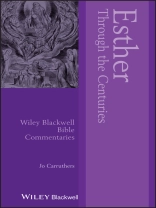This interdisciplinary commentary ranges from early midrashic
interpretation to contemporary rewritings introducing
interpretations of the only biblical book not to mention God.
* Unearths a wealth of neglected rewritings inspired by the
story’s relevance to themes of nationhood, rebellion,
providence, revenge, female heroism, Jewish identity, exile,
genocide and ‘multiculturalism’
* Reveals the various struggles and strategies used by religious
commentators to make sense of this only biblical book that does not
mention God
* Asks why Esther is underestimated by contemporary feminist
scholars despite a long history of subversive rewritings
* Compares the most influential Jewish and Christian
interpretations and interpreters
* Includes an introduction to the book’s myriad
representations in literature, music, and art
* Published in the reception-history series, Blackwell Bible
Commentaries
Mục lục
List of Plates xi
Series Editors’ Preface xiii
Acknowledgements xv
Introduction 1
Why Reception? 2
An Irredeemable Book? 7
Jewish Tradition 10
Christian Tradition 12
Summary of Works 13
Godless Scripture 21
Allegory 28
Providence, Chosenness, Nationhood 32
Political Application 46
Esther as Literature 49
Esther 1:1-9 52
1:1 The King and Empire 53
1:3 The King’s Feast 57
1:4 Display of Wealth 58
1:8 No Compulsion to Drink 59
1:9 Women’s Feast 60
Vashti 61
Esther 1:10-22 68
1:12 Disobedience 68
1:13-22 The Empire Strikes Back 83
1:19 Vashti’s Punishment 88
1:22 The Decree 89
Esther 2:1-7 93
2:1 The King Remembers Vashti 93
2:2-4 To the Harem 95
2:5-6 Mordecai 98
2:7 Hadassah- Esther 103
Esther 2:8-23 109
2:8-14 Esther in the Harem 109
2:15 Esther’s Beauty 121
2:16-18 Esther Becomes Queen 125
Esther 3 133
3:1 Haman 134
3:2 ‘But Mordecai did not bow down’ 139
3:7 Casting Lots 143
3:8 (Mis)Representing Jews: A People Set Apart 145
3:8 Evil Counsellors 151
3:12-15 Genocidal Edicts 155
3:15 ‘The King and Haman sat down to drink’ 157
Esther 4:1-14 160
4:1-3 ‘Great mourning among the Jews’ 160
4:4-14 Esther and Mordecai Confer 163
4:14 ‘From another quarter’ 174
Esther 4:15-17 176
4:15 ‘Fast ye for me’ 176
4:16 ‘If I perish, I perish’ 180
Esther as Exemplar of Resolve 184
4:17 ‘Mordecai [. . .] did everything as Esther had ordered him’ 191
Esther 5 192
Esther before Ahasuerus 192
5:4-8 Esther’s First Banquet 215
5:9-14 Haman’s Wrath 218
Esther 6 221
The King’s Sleeplessness 222
6:11 The Triumph of Mordecai 227
Esther 7 and 8 233
7:1-6 Esther’s Second Banquet 233
7:7-8 Haman’s Fate 238
8:1-6 ‘How can I endure to see the destruction of my kindred?’ 244
8:7-14 The Irreversible Decree 244
8:15-17 ‘The Jews had light, and gladness, and joy, and honour’ 249
Esther 9 and 10 254
9:2 Scenes of Slaughter 256
9:7-10 Ten Sons of Haman 265
9:26 Purim 267
9:29 & 32 ‘Then Esther the Queen . . . wrote with all authority’ 275
10 The Greatness of Mordecai 277
Bibliography 280
Primary Sources
Pre- 1500 280
1500-1800 281
Post- 1800 284
Esther Secondary Sources 289
Other Secondary Sources 293
Index 296
Giới thiệu về tác giả
Jo Carruthers teaches at Lancaster University, UK, and works across the disciplines of literary and religious studies. Her books include The Politics of Purim: Law, Sovereignty and Hospitality in the Aesthetic Afterlives of Esther (2020); England’s Secular Scripture: Islamophobia and the Protestant Aesthetic (2011); and Literature and the Bible: A Reader (with Mark Knight and Andrew Tate, 2013).












